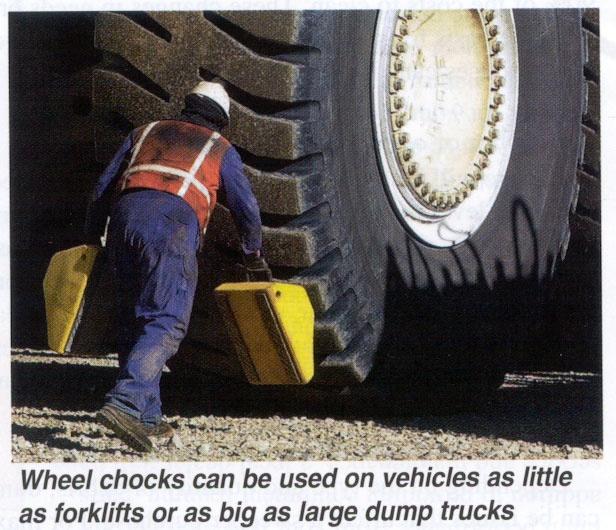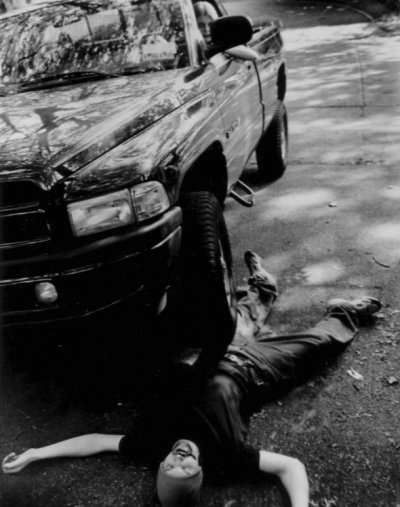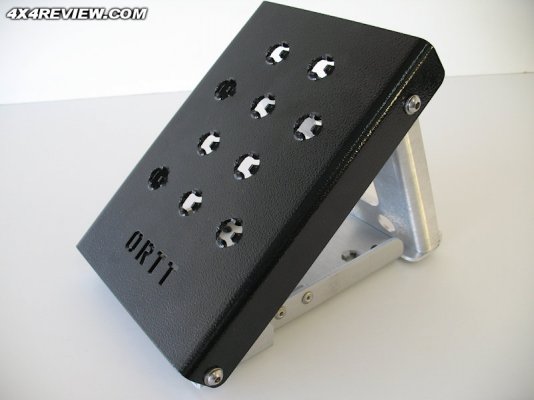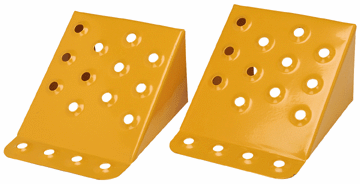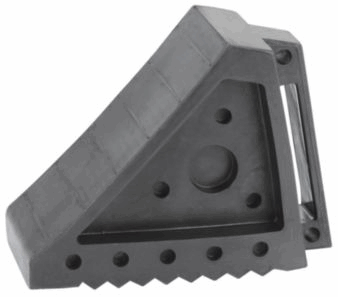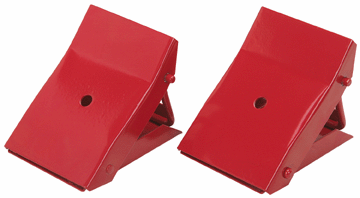All About Chocks
You know those little wedges you can use to keep your car's tire from rolling? They're called wheel chocks, and they could save your life. Wheel chocks are definitely one of those precautionary measures that never capture the limelight; you only realize you need them when they're not there and your car rolls away.
Wheel chocks may seem like pretty boring stuff, but they actually represent a major foundation of physical science. They're technically wedges or ramps, which are both different names for the inclined plane. There are all sorts of things an inclined plane can be used for (such as a bike ramp or an axe), but for our purposes, we'll look at how an inclined plane serves as a wheel chock.
Basically, all a wheel chock does is prevent a wheel from doing what it does best -- rolling. The physical phenomenon of friction (created by the constant exertion of gravity on everything on the planet), keeps the bottom of any wheel pressed firmly against the ground. What a wheel chock does is provide a ramp that the wheel must go up if it wants to continue revolving.
Thanks to our friend gravity, a wheel on an inclined plane will always try to roll to the bottom of that plane (say a gentle hill along your street). A wheel chock provides an opposite angle the sought by a wheel by countering the slope of your street. Voila! Your car's tires can rest easy knowing they've done all they need to do -- find equilibrium.
Wheel chocks also provide a challenge to a wheel. If there's anything a wheel naturally doesn't want to do, it's go uphill. A wheel chock presents this uphill challenge, and it doesn't matter if the hill presented is two inches or two yards, it's going to serve as a barrier and keep your wheel in place.
Choosing Wheel Chocks
Wheel chocks are a relatively cheap investment in your safety and the safety of others. Anyone who's shopped for chocks knows there are a variety of options available on the market. So which one's best for you? (The one that works

)
Wheel chocks are manufactured in different shapes and out of different materials. All, however, are inclined planes; if used correctly, each should perform the job. Since all chocks provide a hill for a wheel to climb if it wants to roll, it doesn't matter if it's two inches or two yards high. That lack of difference pertains only to a perfect wheel, though, and tires aren't perfect wheels. They can change their shape. Tires aren't rigid, so a tire can bend around a small enough chock and continue on its roll downhill. In the case of selecting a wheel chock for tires, the bigger the better. Many chock manufacturers also specify what tire height their chocks are designed to accommodate.
Both metal and synthetic materials are often used for wheel chocks. Aluminum chocks are often designed with teeth on the bottom, which bite into the surface below and provide stability. Synthetic or rubber wheel chocks provide stability through the friction created between the non-slip material and the ground. Just about every manufactured wheel chock also has some kind of tread on its face to produce friction between the tire and the chock. Additionally, some chocks are designed with a curve that hugs the shape of the tire. Others are simple pyramids or may have a lip at the bottom to wedge firmly between the tight spaces where the rubber of the tire leaves the road.
All of these wheel chocks should do the job, but there are other requirements you'll want to take into consideration when selecting chocks for your vehicle. Because weight and gravity combine to force a wheel downhill, be sure you've got a wheel chock that can stand up to the weight of your vehicle. Most chock manufacturers specify what weight their chocks can accommodate, so be sure to check how much your vehicle can handle before purchasing.
The type of vehicle and tire you plan on chocking also make a difference in the chock you choose. Heavy, off-road tires used on large equipment like earthmovers and grading equipment require a different chock than your family sedan. Check the package to find out what kind of vehicle the chocks you're purchasing were designed to accommodate.
Installing Wheel Chocks
Whether you're changing your oil, broken down on the side of the road or some nefarious villain has cut your brake line and you managed to come to a halt before crashing headlong into an overpass embankment, wheel chocks can really come in handy. As we've learned, they provide an uphill impediment to your car's tires, and wheels don't travel naturally uphill. What's more, a wheel chock uses friction to keep your car from sliding. So they're an all-around good investment to keep in your trunk. But exactly what's the best way to install wheel chocks?
Depending on the incline of the street where your vehicle is parked, wheel chocks should be installed on the side of the wheel that faces the downward slope. If you can't figure out which way your street is sloping, or if it seems flat, it's recommended that you chock both sides of the wheel. Always use pairs of chocks in tandem along the rear tires. If you place a chock behind the rear left tire, for example, you'll want to place another chock behind the rear right tire as well. For best results, chocks should be installed on the rear wheels, as recommended by the Occupational Safety and Hazard Administration (OSHA).
Always place wheel chocks against the direction of the grade
When you need wheel chocks can be a matter of fate, such as when you're stranded on the side of the road. In these cases, you won't have much choice about the conditions of where your car is parked, like the gradient of the road. But if you're carrying out maintenance on your car (a situation that always calls for chocks) and you have a choice of where to park it, there're some factors you should consider.
First, look at the type of ground on which you're parked. A smooth surface like pavement or concrete will provide the most friction for the bottom of the chock to grip. Loose terrain like dirt or gravel can allow the chock (and your car) to slip and skid. Dry ground is also important; ice or rain-soaked pavement can also reduce the friction your wheel chock needs to do its job.
Second, try to find a place away from the wind or protected by windbreaks like trees or structures. A strong wind can roll a car, and you don't want that. The ideal place to park your car when using wheel chocks is on a flat, dry, smooth strip of pavement away from wind gusts.
When you're using wheel chocks, be sure to park your car and engage your emergency brake before installing the chocks. Place the chocks against the tire and make sure they're snug and in the center of the tire, never to one side or the other. Follow a similar procedure if you're using wheel chocks on a trailer you're storing (which is always recommended). Keep the trailer attached to the vehicle that's towing it. Place the vehicle in park and engage the emergency brake. Install wheel chocks on both sides of both wheels of the trailer securely. Now you can detach the trailer from your vehicle.
Taking just a moment of effort to install wheel chocks can prevent an accident that could harm or even kill you or others. And with most wheel chocks priced in the $10 to $30 range, how can you afford not to have a pair? (Every man needs a pair!

)
Source: How Stuff Works (you didn't think I wrote all this blather about wheel chocks did you?)
